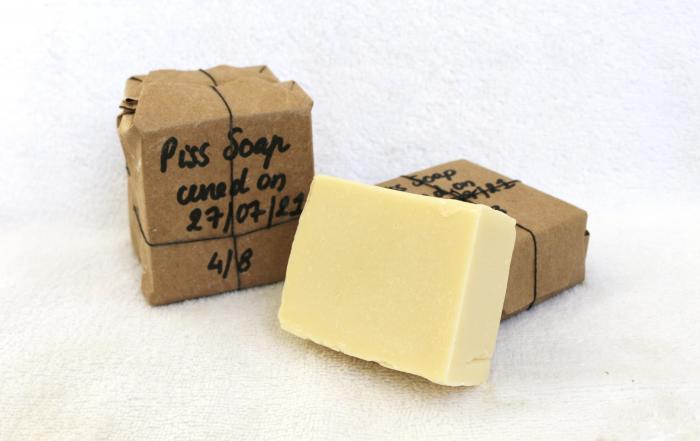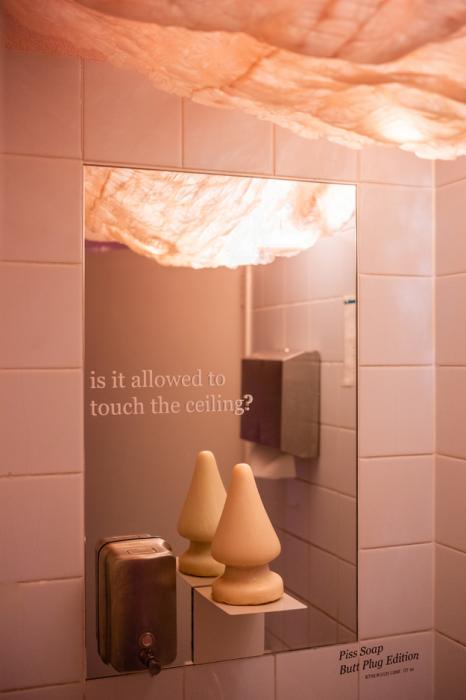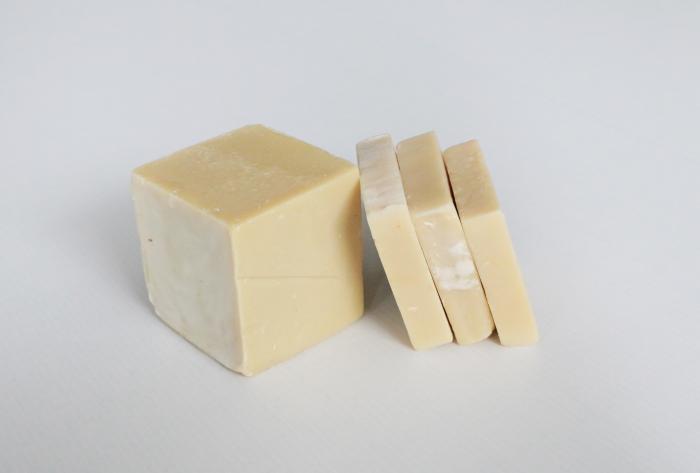Piss soap is made entirely out of human activity waste materials, namely wood ashes, used cooking oil and urine. All these materials can be easily gathered locally from a urban environment. The gathering of material and production of the Piss Soap is locally implemented and redistributed to the public cleaning services as well as the inhabitants. Piss soap has a regenerative impact in our cities, allowing to transform in a creative and useful way, wastes that our cities congregate.
In a time of global pandemic and environmental crisi, the conception of what is disgusting is narrowing to be more restrictive than ever. The constant fear and anxiety related to contamination promotes a more prude society, concerning the notion of filth and disgust. As Mary Douglas elaborated in Purity and Danger, dirt is only “matter out of place”. The idea of Piss Soap is to offer a new place for waste and discarded material that we load in trash bag and dispose of. The project offers a new cycle of life to waste, creating a circular economy and production that contributes actively to reducing our impact on the environment, while benefiting directly our urban surroundings. Piss soap is made entirely out of human activity waste materials, namely wood ashes, used cooking oil and urine.
Piss soap challenges our understanding of the binary of dirtiness and cleanliness. Can an object be made out of “gruesome” material but be beneficial to our health? Where lays the line for our mental contamination? Using only waste, Piss Soap invite the maker and user to realign their vision upon discarded matter. Are we constantly trashing matter that has the potential to be repurposed, recycled, and reused? Piss Soap proposes a deviant and yet conscious approach to tackle our waste issue, asking you to think twice next time you flush.
All the raw materials needed to make Piss Soap can be collected and transformed on a local scale of a city and then redistributed for cleaning of roads, streets or other public spaces. Individuals and inhabitants would be invited to gather and bring their own raw materials to receive Piss Soap for their domestic use. Piss Soap is also a social project that intends to create awareness and reconnect local communities to their waste management, while offering an usable cleaning product.
Please highlight how the concept/idea can be exemplary in this context
Piss Soap has a positive impact on our urban spaces and life. It is a soap made out of wood ashes, used frying oil and urine. These raw materials can be found in snack bars, public toilets, many domestic spaces and are usually discarded. Piss Soap proposes a new circular economy where both the public services and the inhabitants can benefit from their own waste, while keeping our streets cleaned. Additionally, I think Piss Soap contributes to the Waste Framework Directive that requires EU countries to take measures to treat waste oils while protecting human health and their environment.
Using only waste and very little energy to create the Piss Soap makes this material regenerative for our environment. The gathering of material and production of the Piss Soap can be easily locally implemented and redistributed.
Similarly to the project of Precious Plastic (NL), Piss Soap can be carried through by creating small scale recycling and transforming points, locally present to facilitate local waste management. This structure can be recreated in many neighbourhoods and benefit diverse communities while contributing to reducing their wastes. Furthermore, in collaboration with municipalities, the raw waste materials can be collected from waste disposal facilities, participating in the circular economy of the cities.
At the time we stand in our current climate crisis, sustainability seems to be a light approach to counteract the environmental deterioration. As a result, we need to create regenerative processes that will directly impact positively this tendency. Overall Piss Soap have a strong ecological added value as it consumes waste to transform them into a product that will dissolve after its use, proposing a new cycle of life to materials, discarded and amassed in our cities.
Please highlight how the concept/idea can be exemplary in this context
Piss Soap is a new material in our society, that can be applied to many shapes and supports. The current intentions behind it are to start producing local Piss Soap and adapt its shape and form to the context it is the most needed. Until now, it takes the shape of a simple soap bar and can be developed in pleasant shapes facilitating, both the connection with the audience and its use, informed by ergonomic experiences.
Piss Soap carries a strong social stigma by its waste composition, therefore the quality of the experience is crucial to the development of the concept. This material and product might not carry the best qualities compare to non regenerative alternatives currently available on the market. However, its environmental impact and the story behind the urgency for this product can seduce audiences to start using it.
Moreover, I am currently researching how to enhance the user experience in making its use, a more pleasureful moment. Soap is a product that entangle more than purely aesthetic qualities and call for diverse senses such as smell and touch. I am developing a new material research to elevate its smell and increase its foaming capacities. To achieve such, I am investigating the creation of scented essential oils made out of organic waste ( food waste from local market and native plants), found in urban environment. Both these elements seem crucial to add to the quality of experience and seduce local partners and users.
Please highlight how the concept/idea can be exemplary in this context
Piss soap is not only a product, it is also a process. I intend to share the recipe and process publicly, allowing everyone to reproduce it at home. Using domestic appliances and their wastes, each household could gain the knowledge to process part of their discarded materials on their own and create their personal circular loop, domiciliary.
Piss Soap aims to offer equal opportunity in matter of access and production while creating a process open for public participation. Through the collecting and transforming points, the cold Piss Soap making process will be taught to the local population via workshops. This sharing of knowledge is open to all ages, social levels, genders and cultures that are present in our cities.
Furthermore, the local inhabitants that would collect waste materials would be able to receive Piss Soap for their personal uses. The intention behind Piss Soap is to create a strong social awareness concerning our wastes and understand the potential that lays around us to counter climate change.
Piss Soap invites the citizen to engage directly with their own waste management without creating individual ecological guilt. The process is simple, affordable and create a new social engagement where each inhabitants is empowered to create ecological change on their local scale.
In the future, Piss Soap could be available via diverse platforms such as the european City Hub program and other institutions participating actively in the european Green Deal.
Please highlight how this approach can be exemplary
Overall Piss Soap is not only circular or sustainable but regenerative for our environment and urban habitats. It proposes a simple and yet efficient solution to the congregation of wastes in our cities, at restrained costs. It benefits local inhabitants and municipal services in proposing usable cleaning product that assist the quality of life while tackling current issues of the climate crisis.
Piss Soap as a process proposes a new radical approach to socio-ecological action on local scales. It is democratic, accessible and universal. It is open to anyone to create and adapt, opening the door for further social engagements and potential developments.
It is open source and participates actively to the program Zero Pollution Action Plan and Toxic Free Circular Economy in Europe.
Moreover, it proposes a social commitment, allowing each european citizens to tackle their own wastes in a simple and direct way. It contributes to create usable cleaning product, helping financially populations with lower incomes.
To conclude, Piss Soap is a radical and yet realistic idea to propose a more ecological future while helping change on small scale communities; a productive and eco-sociological solution for our city wastes.
Piss Soap is unique in its experimental approach and production, and absolutely inexistent on the current market. It proposes an original approach to recycling cooking oils, without competing with the biofuel industry. It combines various wastes that can be found in domestic environments, rendering this process the most accessible possible.
Despite being made out of “gruesome” elements, Piss Soap is safe and hygienic. It aims to enhance the connection between local communities and their waste management in a new way, never experimented before. Beauty and soap industries are currently changing their compositions and recipes to become more sustainable, often making such products less affordable. Piss Soap proposes a radical perspective upon wellness, by sensabilizing society to the abundance that resides within their wastes. Whereas the fabrication and use of Piss Soap can carry a strong social stigma, it represents an enormous added value by its circularity and regenerative impact on our urban environments. Furthermore, Piss Soap can contribute to local economy and potentially develop a new industry of waste disposal.
I am working on producing Piss Soap in larger quantities to be able to implement its use on a local scale. To do so, I am connecting with local partners in Amsterdam to source the main waste materials. Currently, I have the support of a school canteen and a night club to gather some materials. After receiving the Distributed Award 2021: Future Thinking, I am confident in the urgency and relevance of such concept for our future. It is now my wish to develop a space where I can gather and transform these wastes into Piss Soap.
Another point of development I am presently giving attention is the social reach of Piss Soap. Based in the Bijlmer, a multicultural neighbourhood of Amsterdam, my local context seems an ideal site to connect to diverse populations. This location offers both challenges and opportunities in matter of inclusion of the project, motivating my wish to implement the recycling and transforming space there.
Strengthened by my education in Design and Fines Arts, I will promote and communicate Piss Soap using attractive visuals. A point of importance in the communication process will be to insure that the message and values of Piss Soap bring direct knowledge to the viewer and seduce them. I intent to use diverse mediums and support such as poster, digital communication, space and installation design as well as product design and merchandising. I am confident that such will seduce audiences in engaging with the project or participating in its visibility.
Lastly, I am building contacts with various universities (Delft, Leiden, Urban Futures Studio Utrecht) and chemical research institutes for further research and development, concerning composition and waste waters.
If Piss Soap would be awarded the New European Bauhaus Prize 2022, it is my intention to implement a small scale Piss Soap Factory in the city of Amsterdam. Gathering local partners such as the Green Hub (Amsterdam Zuidoost), restaurants, municipal services and inhabitants, the first Piss Soap Factory will start producing usable cleaning products. In a space in the city, this recycling platform will gather and transform local waste to produce Piss Soap and distribute it in its direct surroundings. To seduce more users, presentations and demonstrations of the uses and results of the soaps will be held publicly. During the first year of production, research and development will be focused on diversifying the range of products, proposing hand soaps and laundry soaps in various smells and shapes to complete the Piss Soap bars available.
After opening the factory space, the communication and workshop program will start. They will be proposed to schools, kids, and adult inhabitants of the district for free. This will help create a social bond within the neighbours and enlarge both the impact and production capacities of the project. The Piss Soap Factory aims to be a welcoming space of experimentation that will invite any curious inhabitants to deliver their waste and learn how to transform them, while inscribing a new circular waste transformation in our city.
Piss Soap could receive great municipal support as it participates in the city’s goal in becoming litter free by 2030.
As the impact of Piss Soap develop, I wish for it to become a project that each european citizen could undertake. I will make available the process of opening the first factory, needed materials and partners to start this initiative in another localities. This process could be enhance through participating in the program of Fab City Hub in Europe. I hope for Piss Soap to be a distributed process shared globally, in various locations, helping our civilisation to tackle wastes in a creative manner
@Guilleminot, 2022
Content licensed to the European Union.


